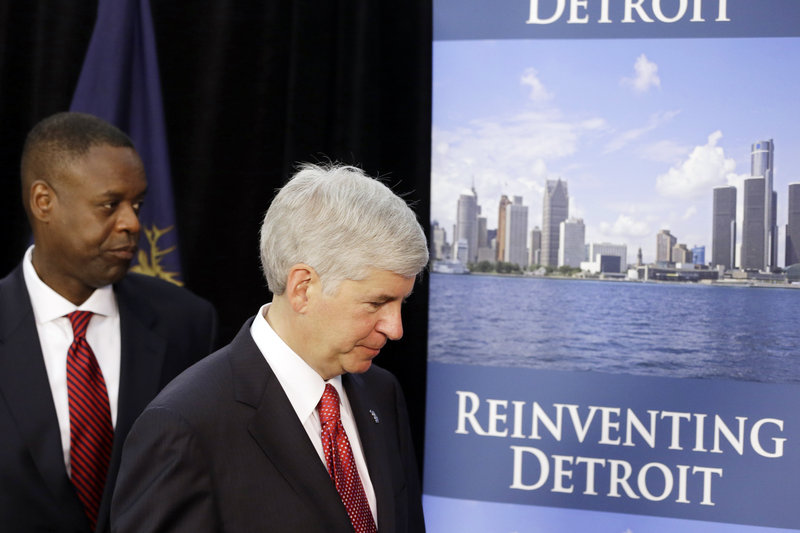DETROIT —
The battle over the future of Detroit is set to begin this week in federal court, where government leaders will square off against retirees in a colossal debate over what the city owes to a prior generation of residents as it tries to rebuild for the next.
Soon after Detroit emergency manager Kevyn Orr and Gov. Rick Snyder approved a bankruptcy filing Thursday, groups representing the 20,000 retirees reliant on city pensions successfully petitioned a county court to effectively freeze the bankruptcy process.
Now, city and state officials, who say the court ruling will not affect their plans, are asking a federal judge to hold hearings early this week to validate the bankruptcy and move forward with a strategy for Detroit to discharge much of its estimated $19 billion debt.
Orr has promised that retired city workers, police officers and firefighters will not see pensions or health benefits cut for at least six months. But Sunday, he said those retirement benefits will have to be cut down the road.
“There are going to be some adjustments,” Orr said on “Fox News Sunday.” “We don’t have a choice.”
But the prospect of cuts has sent a deep wave of fear over Detroit’s retirees, who like many in the city are skeptical of Orr, a corporate lawyer who previously worked in the District of Columbia, and Snyder, a Republican unpopular in this deeply Democratic city.
“It’s been a nightmare for all of us,” said Shirley Lightsey, president of the Detroit Retired City Employees Association. “We don’t have that many people with pensions big enough for anything to be taken away from them.”
Of Detroit’s overall debt, about half — $9.2 billion — represents pension and health benefits that the city has promised retirees but that it now says it does not have enough money to fully pay. The lion’s share of the remaining debt is owed to bondholders.
Orr has discussed a range of steps the city could take to pay off its debts, and some have speculated that it could include selling Detroit’s international airport and valuable collections from the Detroit Institute of Arts. For current workers, he has proposed stopping pension contributions and shifting employees to individual retirement savings accounts.
But no part of the bankruptcy process is stirring as many passions as the potential need to slice pensions and benefits for retirees. Small cities that have filed for bankruptcy protection in recent years have significantly cut retirees’ benefits.
Harry Harper, who lives in northeast Detroit and retired in 2003 from the Detroit Water and Sewerage Department after 30 years of service, said talk of benefit cuts is making him very anxious.
“I feel very vulnerable. I don’t feel we have any protection,” said Harper, 61, who receives a $2,100 a month pension. “I thought that at 30 years, you earned a pension that was accrued and you did not have to have a concern about that.”
Retirees such as Harper say that living in Detroit on a fixed pension is tough since public transit has been cut back and fuel prices have been going up. Michigan has among the highest gas prices in the country.
Jeanette Fitz, who retired after 35 years working in accounting for city government, said she fears that a cut to her pension or medical coverage will be devastating.
She pays more than $100 a month for a half-dozen medications, Fitz said, leaving much of her pension payments for her housing and other necessities.
“If they cut it, I’m not going to be able to pay my rent,” she said.
On Sunday, Orr and Snyder said that they empathize with the fears of retirees but added that the city had ignored its problems for too long and that now there was no choice but to limit pension payments.
“You get honest about it to start with,” Snyder said on NBC’s “Meet the Press.” “In many cases for the last 60 years, people have ignored the realities of the situation. We’re being real now.”
Detroit Mayor Dave Bing said on ABC’s “This Week With George Stephanopoulos” that one option not on the table is a federal bailout. “I think it’s very difficult right now to ask directly for support,” he said.
Technically, the dispute between the retirees and government leaders is about how to calculate how much of the pension system is not properly funded.
More fundamentally, though, the question facing Detroit is about how much of its remaining financial resources it will use to repay bondholders who will be needed to lend money to the city in the future, to invest in the city’s basic services and to keep promises made to retirees.
“Ultimately, it’s going to come down to a finite ability to pay,” said Brian O’Keefe, a lawyer who represents retired city workers, police officers and firefighters. “We just simply believe that we must honor our obligation to pensioners who spent their entire lives working for the city.”
Send questions/comments to the editors.



Success. Please wait for the page to reload. If the page does not reload within 5 seconds, please refresh the page.
Enter your email and password to access comments.
Hi, to comment on stories you must . This profile is in addition to your subscription and website login.
Already have a commenting profile? .
Invalid username/password.
Please check your email to confirm and complete your registration.
Only subscribers are eligible to post comments. Please subscribe or login first for digital access. Here’s why.
Use the form below to reset your password. When you've submitted your account email, we will send an email with a reset code.